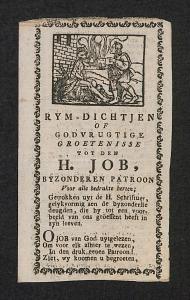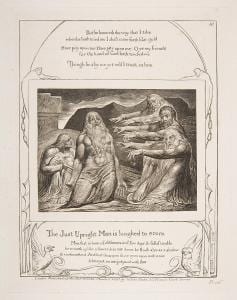 If my reading of Job’s response to his series of tragedies in Job 2:10 in fact represents a chink in the armor of his traditional piety, asking a question rather than stating accepted dogma, then Job’s famous “patience” does not last even two chapters of the total 42! One may only conclude that many readers of the book failed to read very far into the text before creating that frankly absurd cliché. If there is any doubt at all that patience is no characteristic of this man, chapter 3 will lay that nostrum to bed forever. The chapter begins with a startling sentence: “After this Job opened his mouth and cursed his day,” and the resulting tirade indicates that the day he is referring to is his birthday.
If my reading of Job’s response to his series of tragedies in Job 2:10 in fact represents a chink in the armor of his traditional piety, asking a question rather than stating accepted dogma, then Job’s famous “patience” does not last even two chapters of the total 42! One may only conclude that many readers of the book failed to read very far into the text before creating that frankly absurd cliché. If there is any doubt at all that patience is no characteristic of this man, chapter 3 will lay that nostrum to bed forever. The chapter begins with a startling sentence: “After this Job opened his mouth and cursed his day,” and the resulting tirade indicates that the day he is referring to is his birthday.
“Let the day die on which I was born, and the night that claimed, ‘A hero has been conceived’” (Job 3:3)! And with that withering attack on the days of his conception and birth, Job is off to the races of invective, laced with unbridled fury. He shouts a mounting attack that calls down darkness and gloom and blackness and cloud on that monstrous day, finally howling that the night of his conceiving, the result of blessed sex between his parents, should have been “barren,” devoid of any “joyful cry” of pleasure (Job 3:7). He then calls on powerful dark magicians, “those skilled to rouse Leviathan,” the great serpent of the sea (who will appear again in the book), to join him in his act of cursing that day (Job 3:8), adding that the night of that day be forever dark, lacking dawn stars, no hope for light, no “eyelids of the morning” (Job 3:9). This roar of curses is invited by the reality that the day “did not shut the doors of my mother’s womb, hiding trouble (or “toil” or “sorrow”) from my eyes” (Job 3:10). What else can Job be referring to but the assaults of fate he has just witnessed in the prologue, his loss of everything save his very tormented life?
And if the day of his birth cannot be rubbed from the calendar of days, then he shouts, “Why did I not die at birth, come out of the womb and expire” (Job 3:11)? If that had happened, Job goes on to offer perhaps the single longest description of Sheol, the place of the dead, in the Hebrew Bible. But instead of a place of dread, a capacious and deadly maw always ready to swallow all humans, a place to be avoided as long as possible, Job rather longs for the place. “I would be lying down, quiet, asleep, at rest with kings and counselors of the earth, who rebuild ruins for themselves (a deeply cynical notion that archaeology proves again and again as it probes the multiple layers of occupation to be found at numerous Middle Eastern sites), or with princes who have gold, who fill their houses with silver” (Job 3:13-15). Sheol would be far preferable to the monstrous “trouble” that Job has seen; he wishes he were dead!
Then he begins to wander in the fields of philosophy, led by his cynical musings about birth and death. “Why is light given to the one troubled (that word again), life given to the embittered one, who longs for death, but it never comes, who digs for it more than buried treasure” (Job 3:20-21)? He concludes his opening peroration with “the thing I most fear comes to me; what I dread the most befalls me. I am not at ease or quiet; I have no rest, but trembling comes” (Job 3:25-26). What exactly is it that Job fears, what does he dread, what does he imagine causes his trembling? Is it simply the horror that his life has become, or is it also the uncertainty of it all, the unfathomable darkness and mystery at the heart of all things, the ultimate lack of meaning to be found in human existence? The friends may have hoped for Job’s early and silent death, but what they face now is a tortured soul, filled to the brim with serious and anguished questions, accompanied by a pain that will brook no easy and simplistic replies. Of course, the friends will be forced now to reply, to answer this seeker of truth. And they have answers galore and are only too eager to share them with this questing Job. Thus, the human dialogue is joined, a conversation that will not end for many chapters, and one that will reach no satisfactory resolution. Eliphaz, the Temanite, will have first crack.
The first word from the mouth of Eliphaz speaks of a test (the NRSV misses the nuance by translating generically “venture”). This verb appears at the beginning of the harrowing tale of Abraham and Isaac, the supposed test of Abraham’s faith in YHWH, and it occurs in the story of YHWH’s testing of Israel in the wilderness, wondering if they can follow the divine voice of command (Ex.15:25). “If one tested you with a word, will you be offended? But who can refrain from speech” (Job 4:2)? Surely, Eliphaz cannot refrain from speaking; his words will flow in a torrent. Job, he says, has long supported many with his own words of comfort and help, but now when trouble has come his way, he is both “impatient and dismayed” (Job 4:5-6). The would-be comforter now announces his basic beliefs in the foundation of the world’s human interactions as well as his basic understanding about how God is involved in those interactions. Here we discover in essence what all three friends espouse as they attempt to answer the raucous demands of Job.
“Is not your awe (of God) your confidence, your perfect ways your hope? Remember for a moment; which innocent one ever died; where were the upright ever cut off? I have seen that those who plow evil, and sow trouble reap it” (Job 4:6-8). Eliphaz in this speech has said far more than he is aware of. Unknowingly to him, but not to us, the readers of the prologue, he has uttered at least two telling words that characterized Job in the first chapter. He claims to Job that “his perfect ways” are his hope in the world. Job himself was designated as “perfect” (tam) both by the narrator (Job 1:1) and by God (Job 1:8); in addition, Eliphaz claims that any one who was truly “upright” has never been “cut off.” But Job again was called “upright” (yashar) in that same description in chapter 1. Eliphaz has the firm conviction that “perfect” and “upright” people are secure in their hope and are never cut off. They are inevitably and without fail rewarded in life; their perfect uprightness is a guarantee against all disaster. But unfortunately for Eliphaz, the person who gives the complete lie to his certainty sits before him on the heap of ashes! Job is both perfect and upright, according to the very words of God, and he has lost everything; he has no hope and he has been clearly cut off.
And there we find the central key to the increasing anger of the dialogue between Job and his friends. Job will say in as many ways as he can conjure that he is certainly not worthy of the disgusting life he now lives, and will eventually demand that God come to him and explain just why his life has become what it is. And the friends will reply in as many words and advancing fury as they can muster that Job is quite wrong in his fatuous idea that he is innocent before God due to the simple fact that God always and without fail rewards those who are truly innocent and righteous, and always and without fail punishes those who are not innocent and righteous. Job’s very existence on his ashy heap proves beyond all doubt that he is not innocent or righteous, but is instead the foulest sinner on the planet. And so it goes, verse after verse, chapter after chapter, until the friends are at last silenced by the persistent and loquacious Job, until YHWH shows up to offer a divine answer to the whole broiling mess.
It is often said that what the friends of Job represent is a sort of Deuteronomic idea of reward and punishment. A rather more nuanced look at that biblical book suggests that it is not so simple as that; right behaviors, especially careful attention to the commands of God, are not always and inevitably rewarded, nor is the punishment of the wicked always certain. Still, one can easily take any number of verses from the full context of Deuteronomy and conclude that the friends of Job are espousing what those verses imply; God rewards and punishes, they say, but among other things the book of Job will espouse is that such a theological view is foolish, dangerous, and ultimately bankrupt. The author of Job will explicitly reject any such notion about God.
In the next installment of this series, I will look more closely at each of the friends, who though they believe roughly the same things about the universe and about Job, they receive their knowledge in quite distinct ways. And along the way, we will look more closely at Job who moves from a desire for death, to a fury at his plight, to a demand to hear from God, a God who has for some indeterminate reason become Job’s enemy, as far as Job is able to see.
(Images from Wikimedia Commons)











